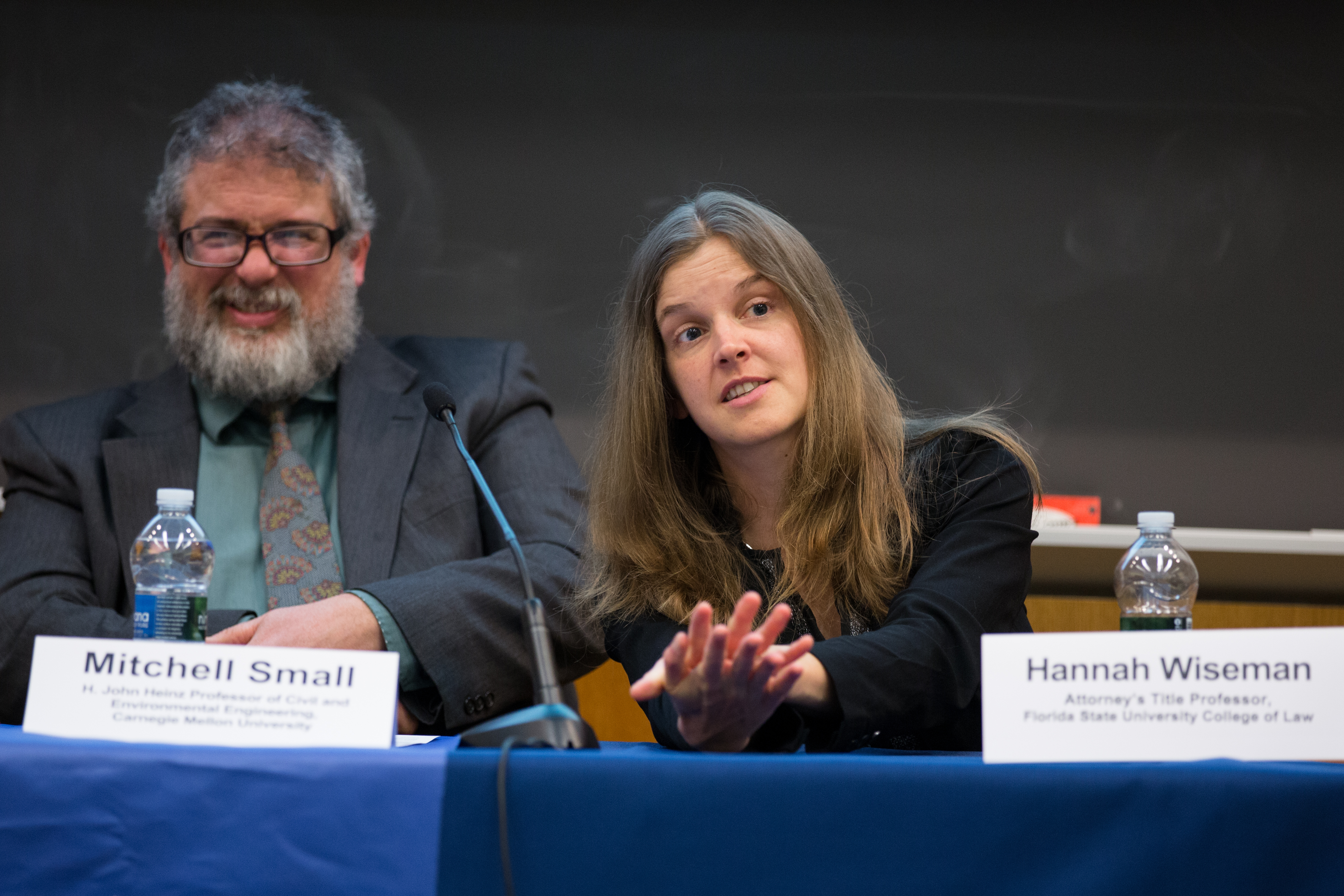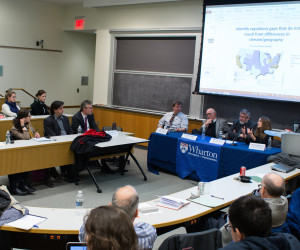
PPR seminar highlights regulatory solutions to risks of unconventional gas development.
Natural gas may be key in allowing the United States to transition away from dependence on harsh-polluting petroleum and toward greater use of cleaner energy sources. Accessing natural gas, however, comes with its own set of risks.
Hydraulic fracturing, or “fracking,” is an increasingly common method of extracting natural gas. Through fracking, fluid is injected at high pressures into wells drilled into rock formations to extract the natural gas within. In the process, fracking can cause air pollution as well as contamination threats for surface waters and underground drinking water sources.
Yet it remains unclear how best to regulate fracking to reduce these risks while still promoting the benefits of readily available natural gas.
Earlier this semester, the Penn Program on Regulation convened a panel discussion of risks and regulatory strategies related to fracking as part of its ongoing Risk Regulation Seminar Series.
To kick off the discussion, Mitchell Small of Carnegie Mellon University provided an overview of some of the key risks associated with fracking, ranging from environmental and ecological risks to socio-economic impacts. One major concern is the release of methane during the fracking process, which can contribute to detrimental climate change effects. Methane releases at some fracking sites are minimal, making the benefits of cheap natural gas appear to outweigh the environmental risks. Other sites, however, experience far greater releases of methane, which may tip the balance of benefits and costs in the other direction.
Current regulatory efforts to address these risks vary as well, according to Small. Voluntary standards have been the widespread approach so far. The voluntary approach relies on industry to identify best practices and govern itself. Of course, concern exists that the cost-conscious incentives of private industry may compromise health and safety under a purely voluntary, self-governing system. Comprehensive development plans, on the other hand, would allow for government pre-approval of fracking projects. To date, such comprehensive plans have only been attempted in relatively few places, including different pilot versions in Colorado and Maryland.
The fracking industry has argued that fracking is not new, and that neither are the risks that come with it. So what has changed in the last half century that creates fresh concerns over its risks? Bernard Goldstein, a toxicologist at the University of Pittsburgh who joined the panel, clarified that the practice is essentially the same, but the difference is the major increase in scale.
Fracking wastewater, or “flowback fluid,” has typically been processed through traditional wastewater treatment processes, similarly to wastewater from power or sewage plants. But the industry is approaching a tipping point, Goldstein argued. He questioned whether existing strategies could suffice to handle the much greater volume of waste produced by fracking today.
A major hurdle to regulating the risks of fracking effectively may be a lack of sufficient transparency in the industry. According to Goldstein, the industry has been particularly secretive about the health risks of fracking.
In Pennsylvania, for example, advisory committees were created to oversee the state’s booming natural gas industry. However, Goldstein stated that, among the roughly 50 people to serve on the committees, not one initial committee member had a public health background. Goldstein questioned the rationale for not fully investigating health risks before embracing fracking.
The final panelist, Hannah Wiseman of Florida State University College of Law, zeroed in on the role of regulators. Although industry has the most knowledge of the relevant technology, Wiseman argued that agencies are better suited to regulate fracking than industry itself. She reasoned that agencies have a “bird’s eye view,” without the industry’s apparent financial incentives to cut corners, giving them a comparative advantage for regulating better.
Wiseman emphasized three reasons why fracking regulation may be preferable to industry self-governance. First, government agencies are able to analyze better the cumulative impacts on the environment, communities, and habitats of multiple fracking operations, not just a single site. Second, agencies can be flexible to meet changing conditions, although they may also be dependent on legislatures to enable them to make major adaptations. Finally, the involvement of government regulators can lead to a better understanding of the risks and benefits of fracking overall, by requiring uniform data reporting and inspection criteria.
Despite Wiseman’s argument for a greater role for government regulation, the panel overall acknowledged that the immediate future of fracking regulation may not be very progressive, as some states are pushing for less regulation — or even none at all. The limitations of government agencies, including funding scarcity and concern about regulatory capture by industry interests, may also hinder fracking regulation.

Mark Alan Hughes, Faculty Director of the Kleinman Center for Energy Policy, one of the event’s co-sponsors.
In the weeks following the seminar, the U.S. Department of Interior issued a set of federal rules aimed at regulating unconventional oil and gas development. While the new rules mark the most comprehensive federal fracking regulation to date, they apply only to federal and Indian lands, falling short of many environmentalists’ hopes. Still, the new federal rules have evoked legal challenges from industry parties.
The risks and regulatory solutions for fracking discussed by the panel seem likely to remain a hotly debated topic for some time to come.
The monthly Risk Regulation Seminar series at the University of Pennsylvania is regularly organized and sponsored by the university-wide Penn Program on Regulation centered at the University of Pennsylvania Law School as well as by the Wharton Risk Management and Decision Processes Center. The panel discussion on the risks and regulatory governance of hydraulic fracturing was also co-sponsored by Penn’s new Kleinman Center for Energy Policy as well as the Wharton-led Initiative on Global Environmental Leadership.






